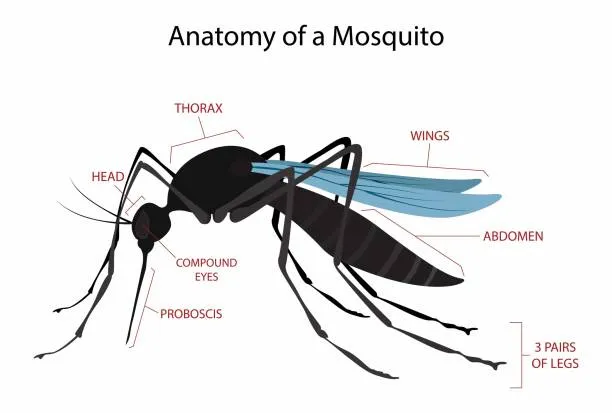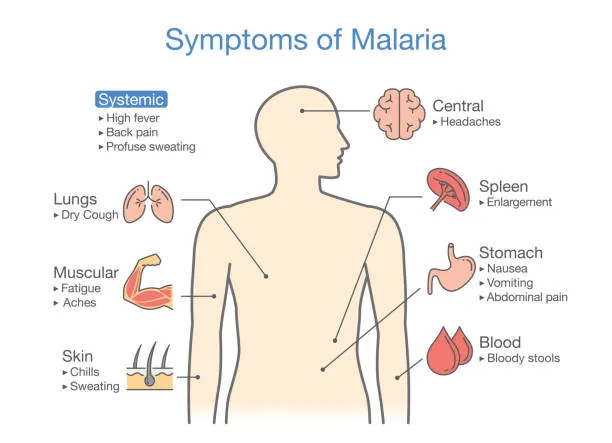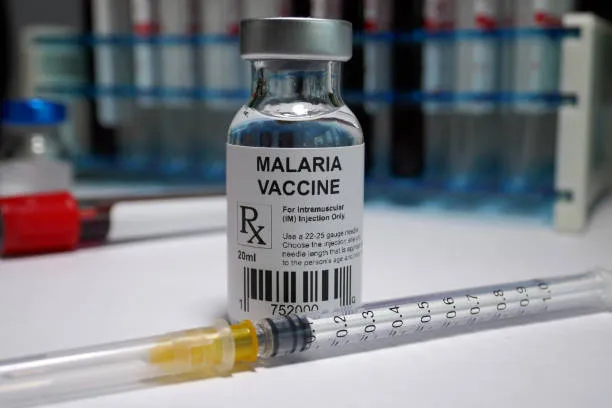
Malaria is a serious and potentially life-threatening disease caused by parasites that are transmitted to people through the bites of infected mosquitoes. The parasites multiply in the liver, and then infect red blood cells. Common symptoms of malaria include fever, chills, fatigue, headache, muscle pain, and nausea. If left untreated, malaria can cause severe illness and death. There are a number of effective treatments for malaria, and steps can be taken to prevent infection, such as using mosquito nets and insect repellents, and taking prophylactic medications.
It is of vital importance to understand the causes, symptoms, prevention and treatment of malaria in order to reduce the number of cases and deaths due to this disease. Understanding the causes of malaria and the risk factors associated with it can help provide information on how to prevent it. Additionally, recognizing the symptoms of malaria and seeking treatment promptly can help in minimizing its effects. Finally, understanding the available treatment options and their effectiveness can help in providing the best possible care for those affected by malaria. By taking all of these steps, we can work towards reducing the number of cases and deaths due to this deadly disease.
What is Malaria?
Malaria is a potentially fatal infectious disease caused by parasites that are transmitted to humans through the bites of infected female Anopheles mosquitoes. It is caused by 4 species of parasites that belong to the Plasmodium genus. These parasites are transmitted to humans through the bites of infected female Anopheles mosquitoes. Transmission can also occur through blood transfusion,shared needles, or from mother to fetus, resulting in congenital malaria. Malaria is a major global health problem that is estimated to have caused over 400,000 deaths in 2018 alone. It is an important public health problem in many tropical and subtropical countries, including about 90 countries in Asia, 47 countries in Africa, 11 countries in Latin America, the Caribbean, and Oceania.source
Causes of Malaria
Malaria is caused by a group of parasites from the genus Plasmodium, which are transmitted to humans through the bites of infected female Anopheles mosquitoes. There are four species of parasites that belong to the Plasmodium genus that cause malaria in humans. These are Plasmodium falciparum, Plasmodium vivax, Plasmodium malariae and Plasmodium ovale. These parasites enter the human body through the bites of infected female Anopheles mosquitoes. In rare cases, transmission can also occur through blood transfusion, shared needles, or from mother to fetus, resulting in congenital malaria. There are two types of Plasmodium species that cause malaria in humans- Plasmodium falciparum and Plasmodium vivax. The other two species are Plasmodium malariae and Plasmodium ovale. Malaria caused by the Plasmodium falciparum species is more common and is more severe than malaria caused by the Plasmodium vivax species.
Risk Factors for Malaria
The risk factors for contracting malaria are varied and depend on the type of malaria, the species of parasite, the geographical location, and the season. Several factors may increase the risk for contracting malaria. These include travelling to areas where malaria is endemic, having symptoms of other diseases that increase the risk of contracting malaria, having a weak immune system, having a pregnant partner, and having a low blood hemoglobin level.
- Travelling to areas where malaria is endemic : Areas where malaria is endemic are tropical and subtropical regions where the Anopheles mosquitoes that carry the malaria parasites are present. These areas are mostly in the southern hemisphere, between the latitudes of 30 degrees north and 30 degrees south.
- Having symptoms of other diseases that increase the risk of contracting malaria : Having symptoms of other diseases that increase the risk of contracting malaria include having symptoms of cough, fever, vomiting, diarrhea, and rash. These symptoms increase the chances of contracting malaria as the mosquitoes tend to bite people who are already sick.
- Having a weak immune system : People with a weak immune system are more likely to contract malaria. This is because the immune system is responsible for fighting off the parasites. People who have HIV/AIDS, people who are on certain medications, and people who are undergoing radiation treatment are more likely to contract malaria as their immune system is weaker.
- People with a pregnant partner : People with a pregnant partner are more likely to contract malaria because the parasites can be transmitted from the pregnant partner to the other partner through sex.
- Having a low blood hemoglobin level : People with a low blood hemoglobin level are more likely to contract malaria as the red blood cells are responsible for absorbing the parasites carried by the mosquitoes.

Symptoms of Malaria:
Common symptoms of malaria include:
Fever
Chills
Sweating
Headache
Muscle pain
Nausea
Vomiting
In some cases, people with malaria may also experience more severe symptoms, such as:
Seizures
Coma
Anemia (a decrease in red blood cells)
Kidney failure
Low blood sugar
Abnormal heart rhythms
- Fever : Fever is the most common symptom of malaria and may be accompanied by shaking, shivering, and sweating. This occurs due to the body's attempt to raise its temperature to kill the parasites. Body temperatures usually range between 37.5 °C (99.5 °F) and 39.5 °C (103.1 °F). Other common symptoms of fever may include feeling weak, dizziness, nausea, diarrhea, abdominal pain, and confusion.
- Headache : Headache is a common symptom of malaria that can be caused by a number of causes. A headache caused by malaria occurs due to excess blood flow to the brain as a result of an increase in the body temperature. Joint pain : Joint pain is a symptom of malaria that is usually seen in children. It occurs when the parasites block the growth of bones and inhibit calcium and phosphorus availability in the body.
- Muscle pain : Muscle pain is a common symptom of malaria that occurs when the muscles are affected by the pathology.
- Vomiting : Vomiting is one of the common symptoms of malaria that is seen mostly in young children and pregnant women.
- Anemia : Anemia is a blood disorder that affects the production of red blood cells and their ability to carry oxygen. It may lead to extreme fatigue, breathlessness, and paleness.
- Jaundice : Jaundice is a condition that causes the skin to turn yellow.
- Blood in the stool : Blood in the stool is a rare symptom of malaria, but it can indicate that the parasite is affecting the intestines.Source
Prevention of Malaria
The following measures can be taken to prevent malaria.
- Avoiding the outdoors : This can be done by avoiding the outdoors especially during the hours of dusk and dawn when the mosquitoes are more likely to bite. If it is not possible to avoid the outdoors, use mosquito repellents and wear long clothing and long sleeves.
- Sleeping under insecticide-treated bed nets : Sleeping under insecticide-treated bed nets is the best way to prevent malaria and other insect-borne diseases.
- Using mosquito coils or sprays : Using mosquito coils and sprays are also useful in preventing malaria and other insect-borne diseases.
- Travelling to areas where malaria is not endemic : Travelling to areas where malaria is not endemic is one of the best ways to prevent contracting malaria. If a person is at a high risk of contracting malaria, they should take preventive medication. Travellers can visit their doctor to know more about preventive medication.
Treatment of Malaria
The treatment of malaria depends on the type of malaria. The following are the different types of malaria and their treatment options.
- Uncomplicated P. vivax or P. ovale malaria : Uncomplicated P. vivax or P. ovale malaria can be treated with a single dose of oral medication.
- Complicated P. vivax or P. ovale malaria : Complicated P. vivax or P. ovale malaria is treated with a combination of oral and injectable medications.
- Severe P. falciparum malaria : Severe P. falciparum malaria is treated with a combination of injectable and oral medications.
- Malaria among pregnant women : Malaria among pregnant women is treated with a combination of oral and injectable medications.
Antimalarial Drugs:
Antimalarial drugs are medications used to prevent or treat malaria, a disease caused by parasites that are transmitted to people through the bites of infected mosquitoes. There are several different types of antimalarial drugs, including:
Chloroquine: This drug was once widely used to prevent and treat malaria, but it is no longer effective against most strains of the disease due to widespread resistance. It is still used in some areas, but it may not provide adequate protection against malaria.
Hydroxychloroquine: This drug is similar to chloroquine and is also used to prevent and treat malaria. It is generally considered to be less toxic than chloroquine, but it may not be as effective in preventing malaria in some areas.
Proguanil: This drug is usually taken in combination with another antimalarial medication, such as atovaquone. It is used to prevent and treat malaria, particularly in areas where chloroquine resistance is common.
Atovaquone: This drug is usually taken in combination with another antimalarial medication, such as proguanil. It is used to prevent and treat malaria, particularly in areas where chloroquine resistance is common.
Mefloquine: This drug is used to prevent and treat malaria, particularly in areas where chloroquine resistance is common. It is generally well-tolerated, but it can cause side effects in some people, including nausea, dizziness, and anxiety.
Artemether-lumefantrine: This combination drug is used to treat malaria, particularly in areas where chloroquine and other drugs are not effective. It is usually well-tolerated, but it can cause side effects in some people, including nausea, vomiting, and diarrhea.
It is important to take antimalarial drugs as prescribed and to complete the entire course of treatment to ensure the most effective protection against malaria. You should also take steps to prevent mosquito bites, such as using mosquito nets and wearing protective clothing, to reduce your risk of contracting the disease.
Reference:
https://www.who.int/news-room/fact-sheets/detail/malaria#:~:text=Malaria%20is%20a%20life%2Dthreatening,at%20619%20000%20in%202021.
https://my.clevelandclinic.org/health/diseases/15014-malaria
https://www.mayoclinic.org/diseases-conditions/malaria/symptoms-causes/syc-20351184
https://www.medicalnewstoday.com/articles/150670
